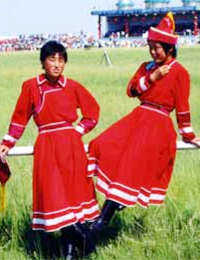 The Ewenki ethnic minority has a population of 26,315 (as of 1990) that is sparsely distributed across seven banners (counties) in the Inner Mongolia Autonomous Region and in Nahe County in Heilongjiang Province.
The Ewenki ethnic minority has a population of 26,315 (as of 1990) that is sparsely distributed across seven banners (counties) in the Inner Mongolia Autonomous Region and in Nahe County in Heilongjiang Province.
The spoken language of the Ewenki people, which is comprised of three dialects, belongs to the Manchu-Tungusic Austronesian of the Altai Phylum. The Ewenkis' language has no written form and Mongolian is spoken in pasturing area while the Chinese language is used in farming regions.
"Ewenki" is the self-given name meaning people living in big mountain forests. They used to be called Suolun, Tonggusi, Yakut, etc. in different periods. In 1957, they were officially named the Ewenki ethnic minority based on the will of the people.
The ancestor of Ewenki people originally lived in the forests northeast of Lake Baikal and along the Shileke River (upper reaches of the Heilongjiang River). They mainly engaged in fishing, hunting and breeding reindeer. Later, they continually moved east. One branch came to settle down in the middle reaches of the Heilongjiang River, known as a "forest people" in the Yuan Dynasty (1271-1368) and people "moving on deer's backs" by the time of the Ming Dynasty (1368-1644). As soon as the Manchu established the Qing Dynasty (1644-1911), they brought the Suoluns under their control. Mixed together with the Mongolians, Daurs, Hans and Oroqens, they gradually developed into an ethnic minority. Their descendants are now the inhabitants of the Ewenki Autonomous Banner.
In the past, they were engaged in animal husbandry and hunting. The Ewenkis are people "moving on deer's backs" -- the only ethnic minority in China who raise deer, and reindeer plays an essential part in the Ewenkis' daily lives.
Most Ewenkis believe in Shamanism while those living in the pastoral areas are followers of Lamaism. There are also a small number believing in the Eastern Orthodox Church.
The cooking utensils of the Ewenki people are unique. Chopsticks made of animal bone, cups made of antler, plackets made of deerskin, etc., all can be found in their homes. They often treat guests to tobacco, milk tea and stewed meat.
The important festivals of the Ewenki people include the Spring Festival, the Mikol Festival and the Aobao Festival. The Mikol Festival, a traditional Ewenki festival, is observed in Chenbaerhu Banner on May 22. On that day the Ewenkis celebrate their harvest.
